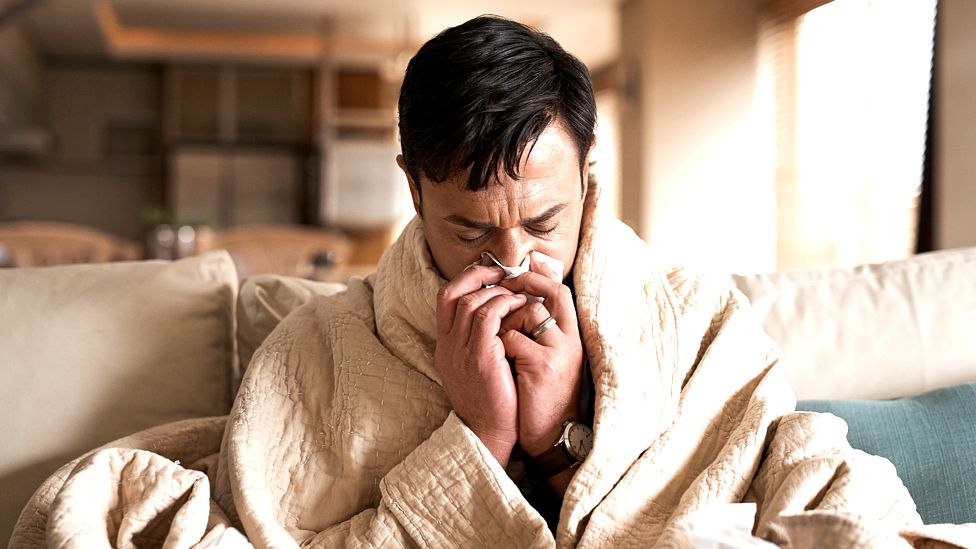Covid: How to look after yourself at home
- Published

So you've caught Covid. What now?
How can you look after yourself or someone else at home, and when should you get extra help?
Tell family and friends
Let people know that you have Covid.
They might be able to help by dropping off food or other supplies, and check how you are doing.
The NHS also has volunteers who can help with things like shopping and collecting medicines. Find out more online or by calling 0808 196 3646 (8am to 8pm, seven days a week).
Anyone who tests positive for Covid is no longer legally required to self-isolate, although it is still recommended.
You are also no longer legally obliged to tell your employer that you have Covid, but are still advised to stay at home and avoid contact with others for at least five full days.
What symptoms can you expect?
Many people will have mild or no symptoms, and will be able to safely ride out the infection at home.
The official list of Covid symptoms has been expanded in England - but not yet in the rest of the UK - from the original three:
- a new, continuous cough
- a fever or high temperature
- loss of or change to smell or taste
It now includes nine other symptoms which are also common signs of other respiratory infections:
- shortness of breath
- feeling tired or exhausted, lack of energy
- muscle aches or pains
- headache that lasts longer than usual
- blocked or runny nose
- sore throat, stuffy or runny nose
- loss of appetite
- diarrhoea
- feeling sick or being sick
It's not possible to tell if you have Covid, flu or another respiratory infection based on symptoms alone, official advice says.
But spotting these symptoms can help to reduce the spread to other more vulnerable people.
If you have any of these symptoms plus a high temperature or you don't feel well enough to go to work or school, you're advised to stay at home.
What else can you do?
Get lots of rest, drink plenty of water and take paracetamol or ibuprofen to help you feel more comfortable.
For a cough, try lying on your side or sitting upright rather than on your back.
Sitting up, rather than lying down, is also good if you are a bit breathless.
You could also try:
- breathing slowly in through your nose and out through your mouth, with your lips together like you're gently blowing out a candle
- relaxing your shoulders, so you're not hunched, and leaning forward slightly with your hands on your knees
- turning down the heating a bit and letting in some fresh air
Some people find a gadget called a pulse oximeter useful. It clips on to your finger and checks the level of oxygen in your blood.
This can be a useful measurement to know, a bit like tracking your temperature with a thermometer.
Low levels of oxygen in your blood can be a sign you're getting worse.
A reading of 95 or above is normal.
If it drops to 93 or 94 and stays like that an hour later, call 111 or your GP for advice. If it is 92 or below (on a device that is certified with a CE mark, and which you are using according to the instructions), go to A&E or call 999.
When should you get medical help?
The NHS website has lots of information about Covid, and you can also get advice over the phone from a pharmacist.
Some people with Covid will need medical care, which might include staying in hospital.
The NHS is also offering some high risk patients a pill they can take at home to help cut the risk of their infection becoming more serious.
Get advice from NHS 111 or your GP if:
- you're feeling gradually more unwell or more breathless
- you have difficulty breathing when you stand up or move around
- you feel very weak, achy or tired
- you're shaking or shivering
- you've lost your appetite
- you're unable to care for yourself - for example, you're struggling to wash, dress or feed yourself
- you still feel unwell after four weeks - you may have long Covid
Go to A&E immediately or call 999 if:
- you're so breathless that you can't say short sentences when resting
- your breathing gets suddenly worse
- you cough up blood
- you feel cold and sweaty, with pale or blotchy skin
- you have a rash that looks like small bruises or bleeding under the skin, and does not fade when you roll a glass over it
- you collapse or faint
- you feel agitated, confused or very drowsy
- you've stopped peeing or are peeing much less than usual
If you're worried about a baby or child, don't delay getting help. If they seem very unwell, are getting worse, or you think there's something seriously wrong, call 999.
- BOOSTER: Who can get the fourth jab and how do you book it?
- SYMPTOMS: Is a runny nose a cold or Covid?
- TESTS: Who can still get free tests?
- ISOLATION: What is the Covid isolation advice now?
- COVID CASES: How many cases are there in my area?
- LONG COVID: What is it and what are the symptoms?
- TREATMENT: What progress is being made?